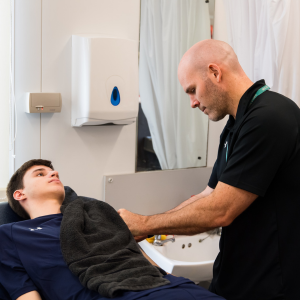Are you passionate about working with professional athletes or helping individuals return to everyday activities? Do you have a keen eye for detail and a fascination with the body's mechanics and its adaptation over time? If so, immerse yourself in our cutting-edge Sports Therapy and Rehabilitation degree.
Accredited by the University of Gloucestershire and offering membership to the Society of Sports Therapists(SST), our Sports Therapy and Rehabilitation degree provides a unique blend of academic learning and practical experience. You'll benefit from insights from leading lecturers and industry professionals, alongside hands-on placements within our elite performance setting at the WISE Campus. This comprehensive approach equips you with diverse career options and development opportunities post-graduation.
This degree prepares you to collaborate with professional athletes in high-performance centres and enhance your expertise to work in clinics and with specialist populations, such as military personnel returning to service. With the growing demand for sports therapists across various sectors, now is the perfect time to embark on this rewarding journey.
'Our Sports Therapy and Rehabilitation degree at our Wise Campus offers a Health care professions council accredited course rich in immersive experiences combined with a comprehensive curriculum. The course covers essential topics like anatomy, physiology, and injury prevention, taught by expert faculty staff. Students benefit from industry standard facilities, hands-on experience, and professional development opportunities such as internships and workshops. Graduates will become well-prepared for careers in diverse settings, including sports teams, clinics, and hospitals through immersion in multidisciplinary settings.
Whilst studying, students of the course will be supported in a collaborative learning environment and have access to student services such as wellbeing and library services as well as the opportunity to take part in our BUCS HE teams in American Football and Football respectively.' - Becky Riddell, Programme Lead
Key Features:
- Professional Placements: Benefit from 200 hours of clinical placement, with opportunities to work with our esteemed professional sports partners, including Bristol Bears, Bristol Flyers, Bristol City Women's Football Club, and Bristol Rovers. This hands-on experience, both pitch-side and in clinic settings, will enhance your skills and prepare you for a successful career in sports therapy.
- Access to Industry Experts: Our teaching team is actively involved in professional development and integrates the latest technologies and concepts into their teaching. With their extensive industry expertise, you'll gain valuable insights from leading professionals and researchers.
- Enrichment Opportunities: Attend seminars with our strength and conditioning team and participate in external events like the Therapy Expo. These opportunities will allow you to hear from consultants and researchers and explore the latest technological advancements, such as shockwave therapies and instrument-assisted massage tools.
- Additional Qualifications: Beyond your degree, we offer subsidised courses in areas like kinesio taping, pitch-side trauma management, and personal training, further enhancing your qualifications.
- BUCS Teams: SGS College boasts a range of BUCS teams, including American Football and Football. You can join these teams and train in our high-performance facilities while pursuing your Sports Therapy and Rehabilitation studies. Scholarships and bursaries are also available for some athletes.
- Academic Support: SGS College’s University Centre is renowned for its exceptional academic support, as evidenced by our high National Student Survey (NSS 2024) scores. Our commitment to student wellbeing and academic excellence is reflected in the 94.6% satisfaction rate among our students, significantly above the national benchmark average.
.svg)




.png)
.png)
.png)
.png)
.png)
.png)
